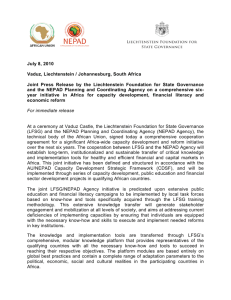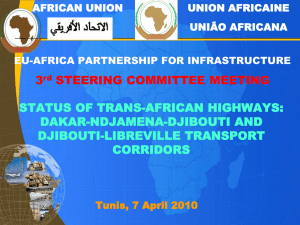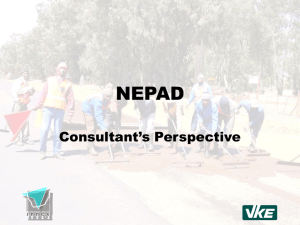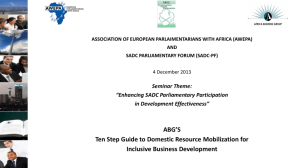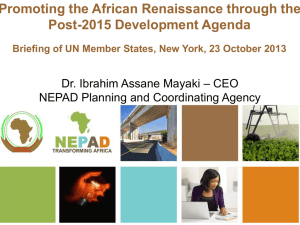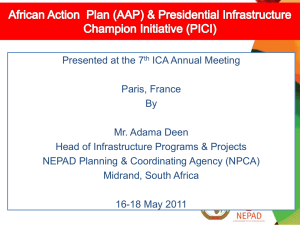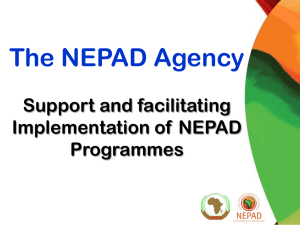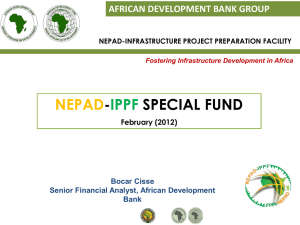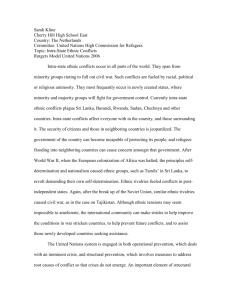Document 10467272
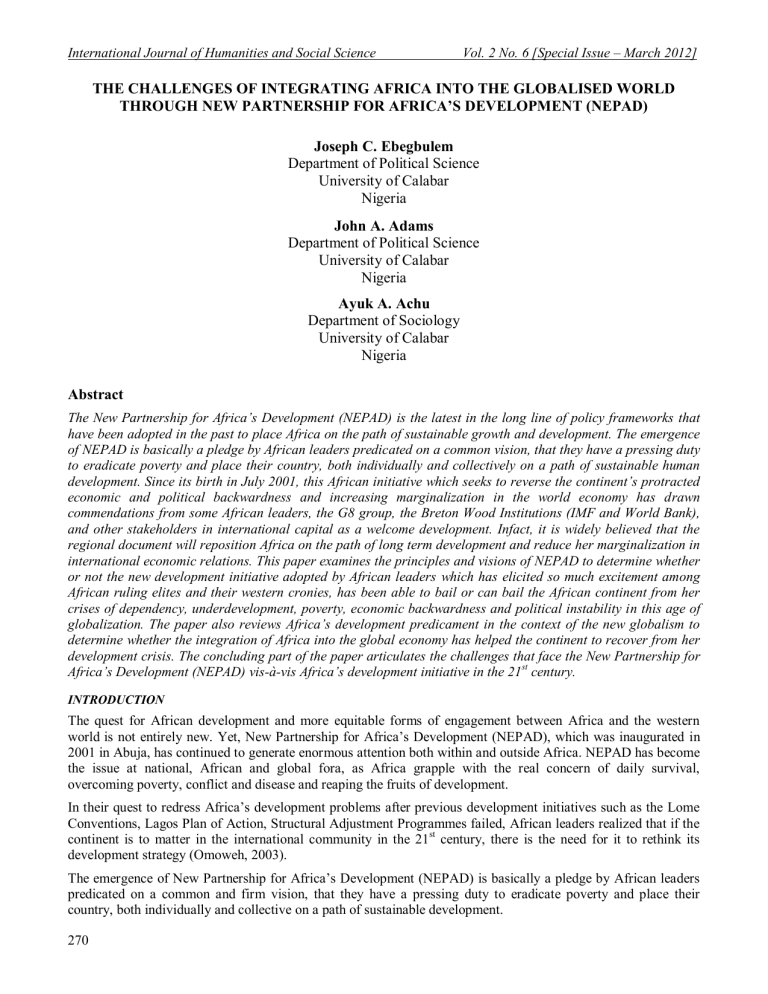
International Journal of Humanities and Social Science Vol. 2 No. 6 [Special Issue – March 2012]
THE CHALLENGES OF INTEGRATING AFRICA INTO THE GLOBALISED WORLD
THROUGH NEW PARTNERSHIP FOR AFRICA’S DEVELOPMENT (NEPAD)
Joseph C. Ebegbulem
Department of Political Science
University of Calabar
Nigeria
John A. Adams
Department of Political Science
University of Calabar
Nigeria
Ayuk A. Achu
Department of Sociology
University of Calabar
Nigeria
Abstract
The New Partnership for Africa’s Development (NEPAD) is the latest in the long line of policy frameworks that have been adopted in the past to place Africa on the path of sustainable growth and development. The emergence of NEPAD is basically a pledge by African leaders predicated on a common vision, that they have a pressing duty to eradicate poverty and place their country, both individually and collectively on a path of sustainable human development. Since its birth in July 2001, this African initiative which seeks to reverse the continent’s protracted economic and political backwardness and increasing marginalization in the world economy has drawn commendations from some African leaders, the G8 group, the Breton Wood Institutions (IMF and World Bank), and other stakeholders in international capital as a welcome development. Infact, it is widely believed that the regional document will reposition Africa on the path of long term development and reduce her marginalization in international economic relations. This paper examines the principles and visions of NEPAD to determine whether or not the new development initiative adopted by African leaders which has elicited so much excitement among
African ruling elites and their western cronies, has been able to bail or can bail the African continent from her crises of dependency, underdevelopment, poverty, economic backwardness and political instability in this age of globalization. The paper also reviews Africa’s development predicament in the context of the new globalism to determine whether the integration of Africa into the global economy has helped the continent to recover from her development crisis. The concluding part of the paper articulates the challenges that face the New Partnership for
Africa’s Development (NEPAD) vis-à-vis Africa’s development initiative in the 21 st
century.
INTRODUCTION
The quest for African development and more equitable forms of engagement between Africa and the western world is not entirely new. Yet, New Partnership for Africa‟s Development (NEPAD), which was inaugurated in
2001 in Abuja, has continued to generate enormous attention both within and outside Africa. NEPAD has become the issue at national, African and global fora, as Africa grapple with the real concern of daily survival, overcoming poverty, conflict and disease and reaping the fruits of development.
In their quest to redress Africa‟s development problems after previous development initiatives such as the Lome
Conventions, Lagos Plan of Action, Structural Adjustment Programmes failed, African leaders realized that if the continent is to matter in the international community in the 21 st
century, there is the need for it to rethink its development strategy (Omoweh, 2003).
The emergence of New Partnership for Africa‟s Development (NEPAD) is basically a pledge by African leaders predicated on a common and firm vision, that they have a pressing duty to eradicate poverty and place their country, both individually and collective on a path of sustainable development.
270
The Special Issue on Behavioral and Social Science © Centre for Promoting Ideas, USA www.ijhssnet.com
NEPAD therefore incorporates a commitment by African leaders to create and consolidate basic processes and practices of governance that are in line with the principles of transparency, respect for human rights, promotion of the rule of law, accountability, integrity etc.
The challenging concern of African political leaders since the attainment of political independence by African countries has the question of continental poor social life and underdevelopment, which manifests itself in the form of poor health conditions, general poverty, infant mortality and economic backwardness. It is therefore believed that NEPAD will reposition the African continent on the path of long term development and minimize her marginalization and neglect in international economic relations. NEPAD is therefore, a commitment by African leaders to accelerate the integration of the African continent into the global economy, as well as a call to the rest of the world to partner with Africa in her own development on the basis of her own agenda and programme of action.
However, the central question that forms the thrust of this paper is, whether NEPAD is a viable instrument that will uplift Africa‟s political and socio-economic development in the 21 st
century, despite the failure of other initiatives before it.
OBJECTIVES OF NEPAD
NEPAD‟s objectives as contained in the NEPAD document 2001 (Articles 174-188) are classified into two broad categories, namely:
(i) Long Term Objectives;
(ii) Short Term and Medium Term Objectives.
LONG TERM OBJECTIVES
The Long Term Objectives include the following:
(a) To eradicate poverty in Africa and to place African countries, both individually and collectively, on the path of sustainable growth and development and thus halt the marginalization of Africa in the globalization process.
(b) To promote the role of women in all activities.
SHORT AND MEDIUM TERM OBJECTIVES
(a) Strengthening mechanisms for conflict prevention management and resolution at the sub-regional and continental levels, and to ensure that these mechanisms are used to restore and maintain peace.
(b) Promoting and protecting democracy and human rights in their respective countries and regions, by developing clear standards of accountability, transparency and participatory governance at the national and sub-national levels.
(c) Restoring and maintaining macro-economic stability, especially by developing appropriate standards and targets for fiscal and monetary policies and introducing appropriate institutional framework to achieve these standards.
(d) Instituting transparent legal and regulatory frameworks for financial markets and the auditing of private companies and the public sector.
(e) Revitalizing and extending the provision of education, technical training and health services, with high priority given to addressing the problems of HIV/AIDS, malaria and other communicable diseases.
(f) Promoting the role of women in social and economic development by reinforcing their capacity in the domains of education and training; by developing revenue-generating activities through facilitating access to credit; and by assuring their participation in the political and economic life of African countries.
(g) Building the capacity of the states in Africa to set and enforce the legal framework, and to maintain law and order.
(h) Promoting the development of infrastructure, agriculture and its diversification into agro-domestic and export markets.
(i) Giving impetus to Africa‟s development by bridging existing gaps in priority sectors in order to enable the continent catch up with the developed parts of the world (Omoweh, 2003).
271
International Journal of Humanities and Social Science Vol. 2 No. 6 [Special Issue – March 2012]
“Interestingly, Omoweh remarked that, in seeking to avoid Africa‟s past painful and failed experiences with development, the regional document establishes a „new‟ partnership that is both credible and capable of reversing the continent‟s protracted economic and political backwardness and increasing marginalization in the world economy” (Onuoha, 2008).
Omoweh further stated that “If anything is new about the NEPAD document and, indeed, a departure from the past, it is the deployment of political strategy by African leaders to the African development crisis.
AN OVERVIEW OF AFRICA’S DEVELOPMENT VIS-À-VIS THE INDUSTRIALISED WORLD
At the close of the 20 th
century, it was clear that Africa had made some progress in addressing some of the fundamental questions in development. But it was noted that more tangible progress would depend on revolving critical issues relating to the linkages between peace, security and development. With this understanding, African governments embarked on the replacement of authoritarian regimes with democratic regimes. Good governance, accountability, and eradication of corruption were wholly accepted as preconditions for political stability and economic development. In the midst of these positive developments, there however remained a few pockets of political crises in countries expressing political stresses and strains of civil war.
The conflicts and crises in most countries emanated from historical legacies, poor democratic development, inequitable economic growth and development, diversity in ethnicity and religion and external political and economic interests (Olaniyan, 2007).
At this time, it was obvious that Africa had not significantly benefited from the spurt of world economic growth at the close of the century. The phenomenon of globalization driven by the advancement in science and technology, resulted in unprecedented development for many countries in other developing regions of the world. On the contrary, Africa's development lagged behind the development of the other developing regions (Daouas, 2001).
The rate of economic growth declined over the years, with an average population growth of 3.5% and average economic growth rate of less than 3%, poverty increased for most countries in the continent. The rate of inflation was high in most countries while unemployment reached unacceptable levels. Food production declined in many countries and this brought to the fore the question of food security. Many countries experienced difficulty in providing other basic human necessities, including adequate shelter, healthcare and education. (Ibid)
The external trade for Africa, especially the export to the world market declined and in effect undermined the capacity to develop. Part of the difficulties that led to the decline in economic growth in the continent were due to the failure to effectively implement national, sub-regional, regional and global policies on development.
Examples of these policies are in the various forms of structural adjustment policies, regional economic integration arrangements, such as ECOWAS, SADC etc. At the regional level, the Lagos Plan of Action and Final
Act of Lagos (1981) was an important development programme that was not effectively implemented. At the global level, important United Nations initiatives, inter alia, include the United Nations Programme of Action for
African Economic Recovery and Development (1986), the United Nations New Agenda for the Development of
Africa in the 1990s (1990), and the United Nations Special Initiative on Africa's Development (1996). It was against this background that the New Partnership for Africa's Development (NEPAD) emerged in 2001 as a new blueprint for the promotion of sustainable development in Africa in the new millennium (Olaniyan, 2007).
NEPAD AND AFRICA’S DEVELOPMENT
Since the formation and activities of NEPAD, there has been growing countervailing views with respect to whether NEPAD can bring about development in Africa. While some conclude that it is a panacea to the development quagmire of Africa, others see it just as an approach that would further entangle Africa with the developed nations, and such perpetuate the slave-master relationship which has all these years failed to bring about Africa‟s development.
Optimists, composed essentially, but exclusively of the proponents of NEPAD see it as opening a new and different chapter in Africa‟s development. One of such optimists is Brian Posthumus. To Posthumus, “this view presents NEPAD as the hope for turning back the clock of delay in Africa” (Posthumus 2009). Optimism about
NEPAD hold that NEPAD represents a tacit recognition by African leaders of the existence of developmental crisis and the need to tackle it. By extension, African leaders admit that the origins of Africa‟s crisis are internal and are linked to issues such as bad governance.
272
The Special Issue on Behavioral and Social Science © Centre for Promoting Ideas, USA www.ijhssnet.com
This thinking stands in sharp contrast to earlier positions depicting Africa‟s challenges as externally generated.
Consequently, Africa seeks in NEPAD measures that directly address the internal constraints to development.
Writing on the identification of bad governance as a cog in the wheel of Africa‟s development, Landsberg (2005) maintains that, “for this reason, overly critical observers of NEPAD commend it for recognizing the centrality of good governance in development and highlighting its pursuit as a central goal.”
NEPAD‟s key instrument for inspiring good governance is the much heralded African Peer Review Mechanism
(APRM). The APRM is a process to which African states submit to periodic review to determine their adherence to principles of good governance set out by the A.U. during its 2002 July Summit in Durban. According to
Akokpari (2004) “the review is done by a seven-member Independent Panel of Eminent Persons (IPEP), which conducts countries through the various stages of the review process…, an exercise to judge countries, but also to assist them to identify policy lapses and create the necessary mechanism to rectify them.” It is believed that a favourable governance review report theoretically increases a country‟s chances of benefiting from the G.8 enhanced partnership. This includes gaining access to financial aid and western markets as well as receiving debt remissions.
Commenting on the positions of NEPAD to Africa‟s development, Koyi (2002) argues that “NEPAD provides an avenue for Africa to engage and negotiate with the West for a new place in the international political economy as well as creates opportunities for the region to take ownership of its development process.”
Adams (2006) also believes that NEPAD has become the defining process in the quest for long term development.
According to him, “the opportunities and benefits of the regional initiative for African nations, individually and collectively, have been stressed by African leaders and their Western allies, especially members of the G.8 group, who have pledged their support.”
The alleviation of pervasive poverty is a key objective of NEPAD. Thus, it is encouraging to see that many
African governments have now embarked on poverty reduction programmes within the framework of NEPAD.
Many African leaders have embarked on market reforms, giving prominence to market forces in economic management.
Together, these factors underscore the efficacy of NEPAD and why this African initiative raises optimism on
Africa‟s long-term development.
THE CHALLENGES OF NEPAD
As lofty as the objectives of NEPAD are, there are some challenges that tend to incapacitate their realization. One of the challenges of NEPAD in realizing its objectives is the G.8, which NEPAD heavily rely on for financial assistance. Corroborating Comet‟s (2002) argument that “a challenge posed to the initiative is the niggardly support for it by the G.8”, Olaopa (2006) writes that “the higher hopes of massive commitment of financial assistance to Africa were clashed by the unenthusiastic promises by the G8 countries, especially by the leading member, the United States. For instance, out of the 64 billion dollar annual investment need and request by
African leaders, only six (6) billion dollars were committed … By implication, the G.8 countries‟ action is an impression that Africa means nothing and is not relevant”. This particular challenge is basically hinged on globalization which emphasis on market economy places premium on profit maximization. This shows why members of the G.8 cannot abandon profit maximization which they are known for and suddenly develop benevolent attitude towards African countries as partners brought together by NEPAD.
Scholars like Adams argued that the G.8‟s benevolence towards Africa will deepen the continent‟s dependence on the capitalist West and worsen Africa‟s socio-economic problems which many African countries are experiencing under globalization. Globalization, which is based on neo-liberal market economy, lays much emphasis on desubsidization, liberalization, deregulation, privatization among others, has brought pain rather than succour to the mass of the African peoples.
The reliance on external financial assistance from the G.8 countries is necessitated by the poverty situations in
Africa, otherwise there wouldn‟t be need to look upon the West for financial assistance. For this reason, poverty is another challenge to NEPAD. The poverty situation in Africa is miserable, with special reference to sub-Saharan
Africa. It is estimated that more than half of the population of sub-Saharan Africa live in poverty, while over 40 percent of sub-Saharan Africans live on less than one dollar a day.
273
International Journal of Humanities and Social Science Vol. 2 No. 6 [Special Issue – March 2012]
With respect to Africa in general, the 2007 World Bank Report, “Global Economic Prospects”, predict that
“globally in 2030, the number of people living on less than the equivalent of $1 a day will fall by half. However,
Africa in 2030 will be home to a larger population of the world‟s poorest people than it is today”.
NEPAD itself recognizes the prevalence of poverty in Africa by stating that “in Africa, 340 million people, or half the population, live on less than $1 per day”. Going by the above comments on the state of poverty in Africa, it is not out of place to conclude that one of the major challenges of NEPAD in achieving its objectives is poverty. The goals of NEPAD cannot be achieved in the face of debilitating and excruciating poverty in the continent as the
African people will not understand the principles and visions of NEPAD when hunger, want and deprivation stare them in the face.
The rash of conflicts wracking different regions of the African continent in the aftermath of the end of the East-
West Cold War is another challenge facing NEPAD. Some of these conflicts assumed genocidal dimensions while in other cases, they resulted in the collapse of central governmental authority as competing armed groups staked their claims for national-territorial control. Without exception, the conflicts also resulted in a massive, perhaps unprecedented displacement of civilian population in the areas that were affected.
The principal reason for the establishment of NEPAD in 2001 was to transform Africa‟s underdevelopment situation to one that could place the continent in a comfortable position in the 21 st
century. That is why NEPAD acknowledges that African leaders have learnt from their own experience that peace and security are major conditions for sustainable development. The devastating effect of conflict on Africa and NEPAD‟s achievement of its objectives is captured by Olaopa (2006) when said that “another problem that could pose a challenge to the proper integration of African states as well as the successful implementation of NEPAD‟s aims and objectives is also the existing conflict between member states which arise as a result of territorial and border conflicts most of which dates back to colonial days”. These conflicts have made the countries involved to focus attention to the resolution or intensification of the conflict by investing much fund on it than sponsoring NEPAD‟s developmental objectives. Hence, according to a World Bank Report, resources diverted by conflict from development use are estimated at $1billion a year in Central Africa and more than $800 million in West Africa. Donors and development agencies have argued that development assistance prospects have suffered in many African countries due to incessant conflicts. Usually, the concern is that resources that are originally planned for the funding of development projects are increasingly diverted to conflict management and peace keeping activities. This is why
Adams (2006) asked thus: “with conflicts springing up in various parts of Africa (Sudan, Ivory Coast, Liberia,
Sierra Leone, etc) will the founders of NEPAD, and indeed leaders of Africa who have embraced the principles and visions of the continental developmental intiaitive, be able to put Africa on the path of long term development?”
NEPAD: CONTRADITCTIONS AND AMBIGUITIES
While NEPAD theoretically promises to set Africa on the path of development, it impacts contradictions and ambiguities, which together raise fundamental questions about its ability to meet its stated objectives. These questions have also become the basis for criticism and pessimism. In the first instance, NEPAD is greatly believed to have western origin and as such cannot bring about African development. The proponents of this view argue that a genuinely formulated African programme will eschew the neo-liberal prescriptions embodied in NEPAD, which more or less are the very policies which constrain the region‟s development (Govender, 2003).
The above argument was corroborated by Okodudu and MacOgonor. According to the duo, “one particular basis for the failure of NEPAD is its neo-liberalist leaning. In particular, the progrmame‟s economic policies is fundamentally flawed as it is largely based on the International Monetary Fund (IMF), and the World Bank policies that have been implemented by African countries for the past two decades with disastrous effects…”
(Okodudu and MacOgonor, 2007). The argument here is that NEPAD like the previous western sponsored programmes such as Structural Adjustment Programme (SAP) cannot help Africa to achieve its developmental objectives.
Again, NEPAD is presented as a programme of partnership, the relationship between the West and Africa is criticized for lacking reciprocity, complementarity or symbiosis that characterize genuine partnership. Asante
(2003) described the partnership as a “partnership of unequal partners.” In this case, the Western partners are expected to bear more burdens for Africa‟s development than Africa itself.
274
The Special Issue on Behavioral and Social Science © Centre for Promoting Ideas, USA www.ijhssnet.com
The implication here is that if the Western partners fail to comply, then NEPAD will be in quagmire to move
Africa‟s development in the 21 st
century. Against this background, Africa‟s reliance on aid for its development will be disappointing as it could be withdrawn at will by the creditor nations and multilateral institutions, and thus will fail to develop Africa. Nabudere (2002) captures this very well when he writes that “aid has been and still continues to be used as security instrument. As soon as the problem is no longer there, the aid stops as we have seen aid decline since the collapse of the Soviet Union…. Aid to Africa had declined from $172billion in 1990 just soon after the collapse of the Berlin Wall in 1989 to $123 billion today. African governments pinning their hopes on investments to the tune of $64 billion per year for NEPAD is too much of a dream which will never become true.” The contention therefore, is that in so far the bulk of the fund needed for African development is from aid, and that aid has been failing in this respect, NEPAD will as well fail to bring about Africa‟s development in the 21 st
century.
As I said earlier, the adoption of neo-liberal economic orientation as a strategy for reaching Africa‟s desirable future in the 21 st
century is problematic. Neo-liberalism sees human beings as consumers that act selfishly. This is why Slater (2004) asserts that “after years of failed development strategies in Africa, surely it cannot be denied that a development strategy for Africa must be one which involves a creative envisaging of a radically different future. NEPAD‟s choice of neo-liberalism as its ideological orientation prevents it from providing this much needed imaginative vision for Africa‟s future.”
Arguably, the essentially neo-liberal framework that informs the economic principles and direction spelt out in the
NEPAD document represents a setback in the African quest for a return to the path of sustained economic growth and development.
New Partnership for Africa‟s development (NEPAD) describes Africa as being marginalized. This marginalization is explained as being a result of Africa‟s poor integration into the global economy and proposes greater Africa incorporation into it. Of course, Africa has been marginalized but NEPAD‟s contention that the marginalization is due to poor integration into the global process is untrue. Nabudere (2002) agrees with this view when he argues that “its marginalization does not lie in it being excluded from the global economy, but in being the most exploited in that global economy”.
Bond (2002) makes a similar point, saying that “marginalization occurred not because of a lack of integration but because of too much of the wrong sort.” NEPAD thus ignores the fact that part of the problem is that Africa is already more integrated into the global economy than any other continent to the detriment of Africa. NEPAD‟s proposal to integrate Africa more into the global economy is rather leading a new course of furthering the continent‟s underdevelopment. Hence, Saul (2002) remarks that “exclusion from the globalization process is not the problem; rather globalization itself is a problematic process that has frequently aggravated poverty.”
It can therefore be concluded that NEPAD has been hailed for giving Africa a lifeline in development, but its heavy reliance on external agencies truncates its ability to generate development given the West‟s appalling record of meeting aid obligations to Africa.
NEPAD‟s objective to “eradicate poverty” is an over ambitious objective which cannot be realized. Throughout history, there is no society that is free from poverty and it is most funny that the objective to “eradicate” poverty is coming from a continent whose constituents are classified as Third World. NEPAD has recognized that poverty is the bane of underdevelopment in Africa and thus swore to fight it from all fronts until it is decisively reduced to non-existence. However, since the establishment of NEPAD, Africa still contain many of its people that live below poverty line, even when the picture in other regions of the world show decline in the number of people living below poverty line. It is worthy to note that sub-Saharan Africa is the bulk of Africa and it is in this region more than anywhere in the world that poverty is more prominent. Many years after the establishment of NEPAD with its avowed objective of “eradicating poverty”, the number of people living in poverty in Africa is on the increase.
In addition, NEPAD‟s acclaimed potential to promote good governance through the innovative African Peer
Review Mechanism (APRM) is another point of contradiction. Submission to APRM is voluntary. Countries which initially signed up can opt out if the process proves instructive. Moreover, African Union (AU) lacks to muscle to compel countries to either sign up to the review process or comply with standards of good governance.
This is a major limitation that has left AU and APRM as a lame leviathan.
275
International Journal of Humanities and Social Science Vol. 2 No. 6 [Special Issue – March 2012]
The political systems in many African states since the establishment of NEPAD portray clear deviation from
NEPAD objectives of democracy, good political and corporate governance. Grotesque human rights restrictions and abuses of rule of law as experienced in Zimbabwe, Cote d‟Ivoire, DRC etc many years after the adoption of
NEPAD and the APRM, are demonstration of contradiction of NEPAD.
The inability of NEPAD and AU to generate good governance is also evident in continuous allegation of corruption and nepotism, involving government officials, including the political leaders. In view of the absence or presence of pseudo democracy, good political and corporate governance in Africa, no meaningful development can take place since both private individuals, corporate organizations and even international bodies are uncomfortable investing in undemocratic societies. NEPAD has failed in halting the undemocratic process of power politics in Africa among many political leaders who in their attempts to perpetuate themselves in power often undertake unconstitutional and violent measures such as suppression of the opposition and the positioning of close relatives and allies in office.
THEORETICAL APPROACH
The explanatory framework to appropriately understand the New Partnership for Africa‟s Development (NEPAD) and which this paper employs is Dependency Theory. For better appreciation of why this theory is chosen, I shall first explain to a great extent the dependency theory and then bring to focus some provisions of NEPAD document which for all intents and purposes depict dependence for the realization of its objectives. What essentially motivated the development of dependency theory was that economic growth in the advanced industrialized countries did not necessarily lead to growth in the poorer countries. The explanation offered for this phenomenon was that poor countries exported primary goods to the rich countries who then manufactured products of these commodities and sold them back to the poorer countries. The value added by manufacturing a usable product always costs more than the primary product used to create those products. Therefore, poorer countries would never be earning enough from their exports to pay for their imports. At this point, dependency theory was viewed as a possible way of explaining the persistent poverty of the poorer countries.
Dependency as a concept can be defined as “a situation in which a certain group of countries have their economy conditioned by the development and expansion of another economy, to which the former is subject” (Dos Santos
1971). Dependency, according to Sunkel (1969) is “an explanation of the economic development of a state in terms of the external influences – political, economic and cultural on national development policies”.
Of the many definitions of dependency, there are three common features. In the first place, dependency characterizes the international system as comprised of two sets of states, variously described as dominant/dependent, centre/periphery or metropolitan/satellite. The dominant, centre or metropolitan states are the advanced industrial states in the Organization of Economic Cooperation and Development (OECD). The dependent, periphery or satellite states are those in Latin America, Asia and Africa, which have low per capita
GNPS, and which rely heavily on the export of a single commodity for foreign exchange earnings.
The second common feature of the position of the dependency theorists in defining dependency is the assumption that external forces are of singular importance to the economic activities within the dependent states. The external forces include multinational corporations, international commodity markets, and other means by which the advanced industrialized countries can represent their economic interests abroad.
In the third place, the definitions of dependency all indicate that the relations between dominant and dependent states are dynamic since the interactions between them reinforce and intensify the unequal pattern. Dependency theory attempts to explain the present underdeveloped state of many nations in the world by examining the patterns of interactions among nations and by arguing that inequality among nations is an intrinsic part of those interactions.
Dependency theorists have noted that underdevelopment is a result of dependent asymmetrical relationship between the Third World and industrialized nations occasioned by the ruthless and unabashed incorporation of the
Third World into global economy firmly controlled by the Western capitalism. It is equally their position that foreign aid is rather a harm than benefit to economic development of the recipient countries, and it is a means of exploitation of the recipient countries by the developed Western countries.
The contributions of these scholars actually agree with the position of NEPAD and its dependent on the Western
Capitalists who most often are willing to extend their aid services to Third World countries.
276
The Special Issue on Behavioral and Social Science © Centre for Promoting Ideas, USA www.ijhssnet.com
The conditions attached to the aid are always stringent and this makes their repayment difficult and stretched to long period which perpetuates the dependency. They argue that these countries are not poor because they lagged behind in the scientific transformations or the enlightenment values of the European states, rather because they were coercively integrated into the European economic system only as producers of raw materials or to serve as repositories of cheap labour, and were denied the opportunity to market their resources in any way that competed with the dominant states. Dependency theorists therefore submit that significant development will only be possible if Third World countries try to isolate themselves from the capitalist world economy and establish autonomous socialist societies.
The dependency theory best analyzes NEPAD because NEPAD itself in many sections of its document portrays dependency on external bodies for the development of Africa. That is why Section V sub-section (C) of NEPAD document – “Mobilizing Resources” in paragraph 47 states that “Africa needs to fill an annual resource gap of 12 percent of its GDP or US$64billion. This will require increased domestic saving as well as improvement on the public revenue collection. However, the bulk of the needed resources will have to be obtained from outside the continent.” Paragraph 41 of the NEPAD document also speaks of Africa‟s dependence on the international community for Africa‟s development when it states thus: “We hold that, it is within the capacity of the international community to create fair and just conditions in which Africa can participate effectively in the global economy and body politics.”
Generally, NEPAD‟s position is for Africa to “catch-up” with the West and to do this, the Western industrialized partners should assist Africa. This is explicit in the provisions of paragraph 66 of NEPAD document which states:
“The new long term vision will require massive and heavy investment to bridge existing gaps. The challenge ahead for Africa is to be able to raise the required funding under the best conditions possible. We therefore call on our development partners to assist in this endeavour.”
It is therefore in view of the above statements and similar others from NEPAD that I employ dependency theory as a tool of analysis for this paper.
CONCLUSION
It has been the argument of this paper that while the New Partnership for Africa‟s Development (NEPAD) is perceived as a feasible programme that could propel forward Africa‟s economic growth and development agenda towards the realization of the Millennium Development Goals by 2015, there will exists a big chasm in its potentiality to attain the desired objectives. NEPAD, as a pledge by African leaders that they have a collective responsibility to eradicate poverty and ensure sustainable development in Africa has not been able to achieve this and other various objectives it sets out to achieve. No appreciable progress has been made in eradicating poverty in Africa.
NEPAD can only succeed in achieving its objectives as enumerated in the NEPAD document if African leaders and the leaders of the industrialized nations (the G.8) are sincere and well committed in their motives rather than re-establishing a kind of dependency (master-servant) relationship that will at the end impoverish Africans the more. On the other hand, African leaders must be ready to take on the task of developing the African continent without mortgaging the continent for aids from the industrialized countries. The conditions attached to these aids are always stringent and this makes their repayment difficult and stretched to long period which perpetuates dependency.
Governance in Africa is beset with corruption, nepotism and neo-patrimonialism, which together have compounded the continent‟s development challenges. These conditions negatively affect the development of
Africa.
Again, in as much as Africa‟s development approach through NEPAD heavily rely on the financial aid flow from the West, which is exploitative in character, the development agenda of NEPAD is likely to be a mirage.
277
International Journal of Humanities and Social Science Vol. 2 No. 6 [Special Issue – March 2012]
REFERENCES
Adams, J. (2006) “Rethinking Africa‟s Development through the New Partnership for Africa‟s Development
(NEPAD): The Challenges and Way Forward”. Calabar: Journal of Politics and Administration. Vol. 3,
No. 1
Asante, S. K. B. (2003) “NEPAD: A Partnership of Unequal Partners”. London: New Africa
Dos Santos, T. (1971) “The Structure of Dependence” in K. T. Fan and Donald C. Hodges (eds) Reading in U.S.
Imperialism. Boston: Porter Sargent
Govender, V. (2003) “How are the SADC NGOs Influencing Regional Development in Terms of NEPAD” in
Brian Posthumus (ed) NEPAD: A New Partnership. Amsterdam: Netherlands Institute for Southern
Africa
Nabudere, D. W. (2002) NEPAD: Historical Background and its Prospects
(http://www.aids.org.za/web/nepad.arrs.html)
Okodudu, S. A. and MacOgonor C. U. (2007) “NEPAD and Africa‟s Development”, Journal of Public Policy
Analysis. Vol. 1, No. 1
Olaniyan, O. (2007) New Partnership for Africa‟s Development (NEPAD): Patterns of International Response.
Lagos
Olaopa, O. R. (2006) “New Partnership for Africa‟s Development: Its Challenges for Local level Government” in
International Research Journal of Finance and Economics. Issue 5
Omoweh, D. A. (2003) “The New Partnership for Africa‟s Development NEPAD: Another False Start?” The
Nigerian Social Scientist, Vol. 6, No. 1
Onuoha, J. (2008) Beyond Diplomacy: Contemporary Issues in International Relations. Nsukka: Great AP
Express Publishers Ltd.
Posthumus, B. (2009) “A Conference Report”, in Brian Posthumus (ed) NEPAD: A New Partnership?
Amsterdam: Netherlands Institute for Southern Africa
Saul, J. (2002) “Response to Robert Flower Re: NEPAD” http://www/web/caliccaf/debtsap/nepadflowerresponse.htm)
Slater, D. (2004) “The Political Meaning of Development in Search of New Horizons”, in F. J. Schumaman (ed)
Beyond the Impasse, New Direction in Development Studies. London: Zed
Sunkel, O. (1969) “National Development Policy and External Defence in Latin America”, The Journal of
Development Studies, Vol. 6 No. 1
278
